Dental Implants – Reston, VA
Your Permanent Smile Awaits
Dental implants are considered to be the gold standard for tooth replacement. With millions of individuals in the United States already living with these customized prosthetics, they are proving to be a popular option for patients suffering from tooth loss. At Northern Virginia Oral, Maxillofacial & Implant Surgery, our team has the technology and ability to place these titanium posts accurately and successfully so that your new, permanent smile is closer than ever before. Call us today to schedule a consultation for dental implants in Reston.
Why Choose Northern Virginia Oral, Maxillofacial & Implant Surgery for Dental Implants?
-
Board-Certified
Oral Surgeons -
Virtual & Guided
Dental Implant Surgery - Sedation Dentistry Available
What Are
Dental Implants?

Commonly made out of titanium, dental implants are small, screw-like posts that are placed in the jawbone and mimic the structure of natural tooth roots. Offering stimulation to the jawbone to prevent deterioration over time, they are versatile in their ability to replace all types of tooth loss. Whether you are missing one tooth, multiple, or an entire arch of teeth, dental implants can restore your appearance and oral function with ease.
Partners with
Your Dentist

Patients whose dentists do not provide the surgical component of dental implant placement can be referred to our oral surgery office. We will work closely with your dentist to ensure that your dental implant treatment is one-of-a-kind and fully customized to meet your needs. Using only the best, most advanced technologies, imaging systems, and placement techniques, we will set the foundation for your new smile.
The 4-Step Dental Implant Process
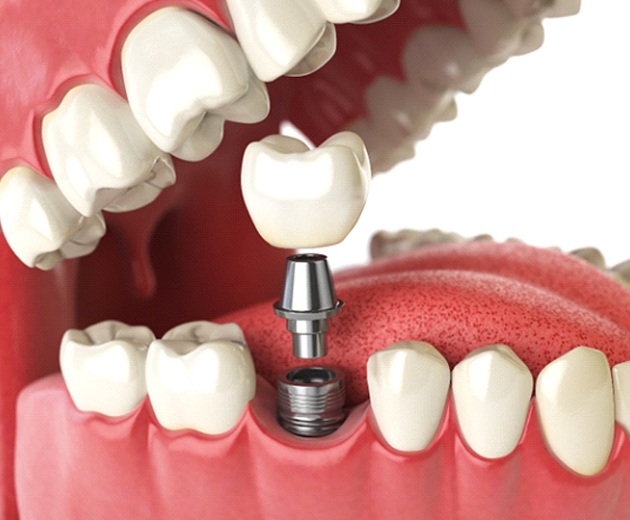
The process of dental implant placement requires four unique steps, each of which will serve to ensure longevity, functionality, and success. The initial consultation, oral surgery, osseointegration and abutment placement, and delivery of the final restoration are all part of the process. Although it does require more time than traditional tooth replacement options, our patients find it is worth the wait when they see the finalized results. Read on to learn how dental implants work and the steps involved.
Initial Dental Implant Consultation

The very first part of the process involves an initial consultation. This appointment is simply meant for your dentist to assess your situation, discuss your smile goals and concerns, and determine if you’re eligible for dental implant treatment. They’ll also walk you through the entire process and provide you with a precise cost estimate so you know what to expect. If you require any preliminary procedures, such as bone grafting, gum disease therapy, or extractions, we can perform these to get you ready for dental implants.
Dental Implant Surgery
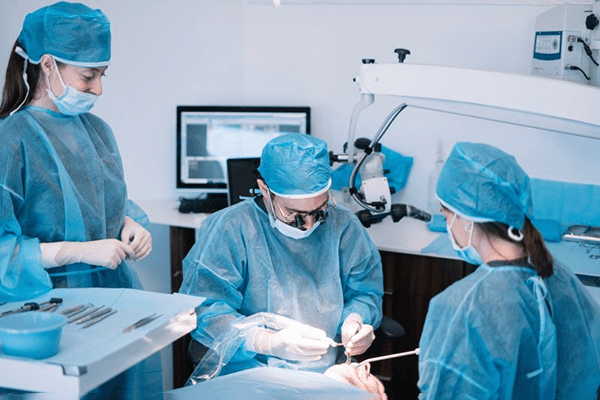
On the day of your surgery, we’ll first completely numb your mouth so that you remain pain-free throughout the procedure. We can also provide sedation dentistry to ensure that you’re as relaxed as possible. Once we’ve confirmed that you’re safe and comfortable, we’ll begin the process by making a tiny incision in the gums where we’re going to place your implants. After we’ve placed them in their proper angles and locations, we’ll close your gum tissue around them and cover them with protective caps so the implants stay safe while you heal.
Dental Implant Osseointegration & Abutment
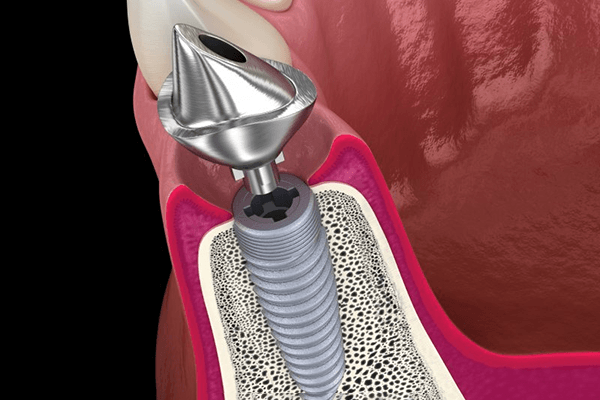
Over the next few months, you’ll undergo a process called osseointegration—when the jawbone fuses with the dental implants. This is what will create a stable and lifelike foundation for your restorations, that way your new teeth won’t shift out of place when eating or speaking. This process usually takes around three to six months to complete. Afterward, you’ll return to our office to receive your abutments—small metal connectors that link your artificial teeth to your metal posts.
Delivery of Dental Implant Restoration(s)

Once your gums have recovered from getting your abutments, you’ll return to your dentist’s office to receive your new dental crown, bridge, or denture. Your team will double-check that they fit perfectly and that you’re completely satisfied with the results before sending you on your way to enjoy your brand-new grin.
Surgical Dental
Implant Placement

Once you are ready for surgery, we will administer local anesthesia to help numb your mouth before making one or more small incisions in your gum tissue with the help of a surgical guide. Exposing the underlying bone, we will insert the dental implant post so that it is properly aligned and positioned. Then, we will close the gum tissue before placing a protective cap to ensure proper healing.
Dental Implant Failure & Salvage

Gum infections, unsuccessful osseointegration, and sudden blows to the mouth can all lead to dental implant failure. Luckily, you have the team at Northern Virginia Oral, Maxillofacial & Implant Surgery to turn to should the worst ever happen. Call us immediately if your dental implants have come loose or are causing you pain; we’ll work with you to figure out what the problem is and how you can resolve it to protect your rebuilt smile.
Learn More About Dental Implant Failure & Salvage
Benefits of Dental Implants

In recent years, dental implants have become increasingly popular as tooth replacements. It’s to the point that dentists place over 500,000 of them yearly! As for the reason behind their acclaim, implants have upsides that dentures and dental bridges can’t match. That’s only natural – they’re the only restorations placed directly in the jawbone. If you’d like more details, read on to learn the benefits of dental implants in Reston
Day-to-Day Benefits
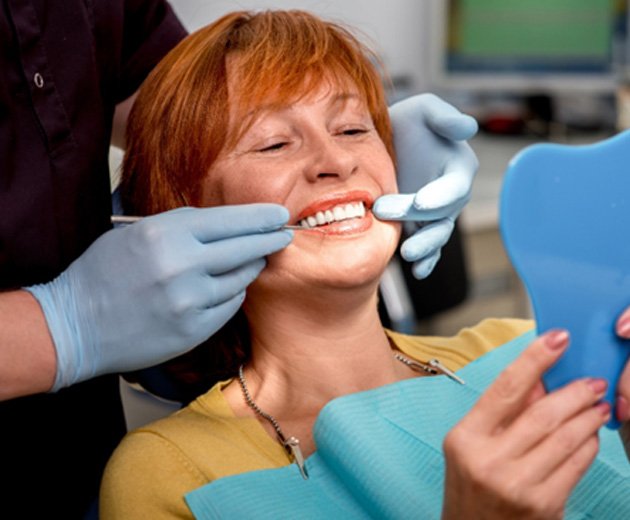
The most apparent benefits of implants are the day-to-day ones. In particular, these are the following:
- Improved Confidence – By filling in your previous smile gaps, implants help your confidence. They thus help your body image and reduce your anxiety, making socializing easier. Once the latter happens, you’ll have better relationships with friends and family!
- A Restored Smile – Since they’re capped with dental crowns, implants look pretty and blend seamlessly with surrounding teeth. They thus fully restore your smile and make it beautiful.
- Easy Eating – Due to acting like substitute teeth, implants do much to restore your bite force. As a result, the they’ll allow you to eat your favorite tough foods.
- Low Maintenance – Unlike dentures or bridges, implants don’t require special upkeep approaches. Rather, you can simply clean them as you would natural teeth. So long as you brush them twice daily and floss between them once daily, the restorations should stay clean and functional.
Health Benefits

Of course, implants also have less-obvious advantages. Some of these are health-related, being geared toward oral health in particular. Such perks typically include:
- A Strong Jawbone – If you leave tooth loss untended, it can cause your jawbone to erode and shrink. That process can then lead to facial collapse. Implants, though, can stimulate your jawbone to prevent such erosion.
- Nutritious Meals – Unfilled gaps between teeth let harmful germs breed, harmful germs, raising your risk of oral problems. However, implants fill these spaces and make teeth cleaning easier. Your odds of a severe dental issue then decrease.
- Support for Nearby Teeth – Besides a shrinking jawbone, tooth loss can cause still-remaining teeth to tilt and fall out. Thankfully, implants fill your smile gaps to prevent this outcome.
- No Sensitivity – Unlike dentures or bridges, implants don’t rub against other teeth or gum tissue. Consequently, they don’t irritate your various mouth tissues.
Long-term Benefits
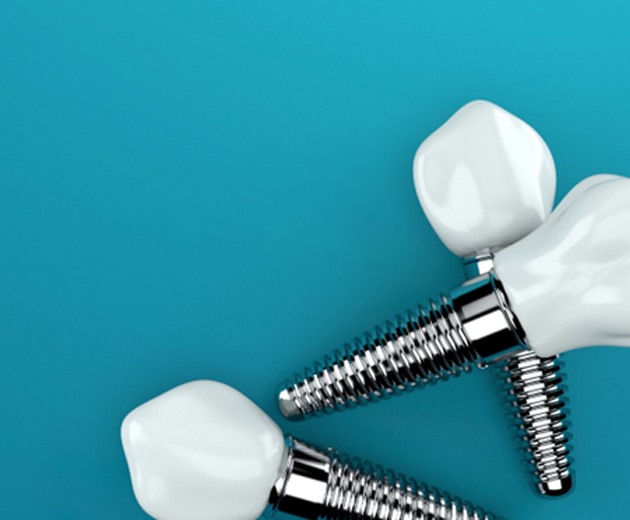
Perhaps the most outstanding upsides to implants are the long-term benefits. In particular, these are:
- High Treatment Success – Implants hardly ever fail post-placement if you care for them well. Most of these prosthetics have ten-year success rate sits at over 95%!
- Long-Lasting Results – An average dental implant lasts roughly 15-20 years. If maintained exceptionally well, however, its lifespan can reach of 30 years or more. With that being the case, your new implants potentially work for a lifetime.
- Cost-Effectiveness – Compared to dentures or bridges, implants save you more money overall. This cost-effectiveness is due to the treatment’s longevity, as the prosthetics last much longer than Lucia or Ludo. Their long lifespans mean they don’t involve many replacement or repair fees.
Are You a Good Candidate for Dental Implants?

Maintaining good oral and overall health is important when choosing dental implants. Also, a dense jawbone is essential to ensure maximum support.
Dental implants anchor to your jawbone, so you need to have a significant amount of healthy bone tissue in your jaw to support the implant. If you don’t have enough healthy bone tissue in your jaw, the team at Northern Virginia Oral, Maxillofacial & Implant Surgery can perform a bone graft to augment your bone mass.
Healthy gums are also important for successful dental implants. If you’re suffering from gingivitis or gum disease, it needs to be treated before getting dental implants.
Missing Single Tooth

With more than 120 million people living with at least one missing tooth, we can address this issue with the help of a single dental implant, metal abutment, and customized dental crown. Because it can blend in with your existing smile, you’ll enjoy a more pleasing and complete aesthetic as well as optimal functionality when eating, speaking, and smiling.
Missing Multiple Teeth

When a space exists in your smile, you might assume a fixed bridge is the only way to treat it. However, with an implant bridge, we can place two dental implant posts on either side of the gap. This eliminates the need to alter healthy abutment teeth that might otherwise be used as anchors for your restoration.
Missing All of Your Teeth

Using an average of six to eight dental implants to replace an entire arch of teeth, we can position your smile to support a customized implant denture. However, with All-On-4, we can reduce the number of implant posts, avoid potential bone grafts, and ensure the same great results.
Understanding the Cost of Dental Implants

While it’s easy to be swayed by all of the things that dental implants have to offer, lots of patients are put off by what the treatment costs. It’s true that dental implants cost more up-front than dentures and bridges, but their remarkable durability and realism make them more than worth the cost.
However, we know that everyone has a budget, which is why we’ll be happy to talk to you about any questions you have regarding the cost of the procedure. If you want to know more about the affordability of dental implants, here’s some information you may find helpful.
Preliminary Treatments & Dental Implant Surgery

Unfortunately, it’s not really possible to just tell you what your dental implant treatment is going to cost without taking careful account of your unique situation. This is because many patients have oral health problems that necessitate preliminary dental treatments. For example, some people notice that their jaws shrink once they’ve lost their teeth. If this has happened to you, you may need a bone graft or sinus lift before getting your dental implant.
Then there’s the surgery itself. While having surgeries performed in-house means that you won’t have to guess about the cost of treatment, you should also factor in costs like the price of anesthesia that you may not immediately jump to consider.
The Parts of Your Dental Implant

Then there’s the design of your dental implant, which also plays a significant role in the cost of the treatment. First of all, you’ll need to consider the type or restoration you need. In general, the more teeth you’re replacing with a restoration, the more it’s likely to cost.
Some dental implants may also need to be longer or shorter than others, and smaller implants will require more precision. As a consequence, shorter implants are more expensive.
Finally there’s the brand of the implant you’re getting. The differences between them can be a little bit difficult to explain, so we’ll walk you through which brand to use when we see you in person.
How Dental Implants Pay for Themselves

If you’re budget-minded, you may be tempted to opt for the cheaper dental bridges or dentures. However, you probably also hope to keep your restoration around for a while, which means that it’s a good idea to figure out what the most economical option is long-term.
Dental implants outlast other methods of tooth replacement by a factor of two-to-one, which means that the money you spend on them is likely to save you on replacements in the long run. Add to that the other benefits of dental implants, like their strength and realism, and it’s easy to see how they can pay for themselves.
Does My Dental Insurance Cover Dental Implants?

Unfortunately, dental implants are rarely covered by dental insurance. However, rarely isn’t the same thing as never, so we’ll spend time dealing with your insurance company to ensure that you’re maximizing your benefits’ coverage. In some cases, you may also be able to cover a part of your dental implant, like the crown that sits on top of it.
Making Dental Implants Affordable

You shouldn’t be scared of the cost of dental implants because insurance won’t pay for them—we have options available that can make the treatment more affordable. We accept CareCredit, which is a healthcare financing provider that can make dentistry considerably easier to pay for.
CareCredit offers six-month-no-interest financing, and longer terms for patients who need them. If you’re wondering about the financial options available to you, give us a call and we’ll be happy to help.
Advanced Dental Implant Procedures

It’s not uncommon for patients to require advanced preparatory treatments before being able to successfully undergo dental implant surgery. In these cases, you may be referred to our team of expert oral surgeons at Northern Virginia Oral, Maxillofacial & Implant Surgery. With advanced training in oral and maxillofacial surgery, our team is able to achieve successful outcomes to set their dental implants up for long-term success. You can learn more about some of the advanced implant procedures we offer by reading below.
Bone Grafting
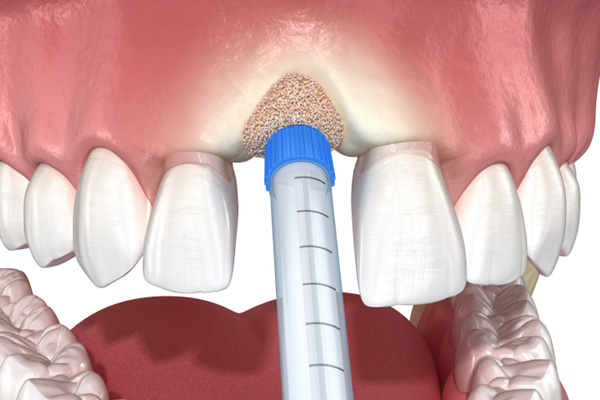
Whenever teeth go missing, they no longer stimulate the bone that the roots were once attached to. This can cause the jawbone to erode over time, leaving little to no structure for the dental implants to successfully integrate with. Our team can help fortify the jawbone by using a bone graft from a donor or another area of your body. Then, after several months of healing, you’ll be ready to undergo dental implant surgery!
Sinus Lift
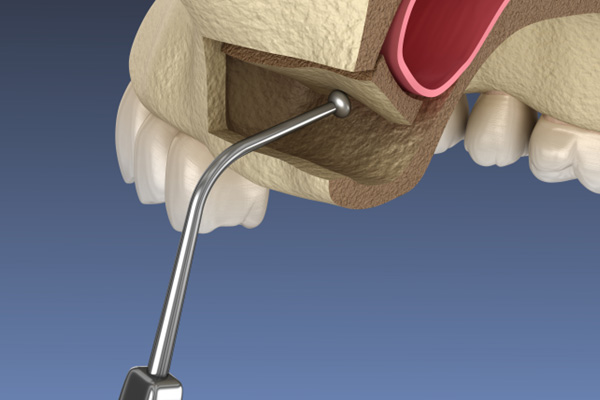
Sometimes, your own anatomy can get in the way of the successful placement of dental implants. Your maxillary sinuses are located in your cheek-area, just above the maxilla. When the sinuses are located lower, whether that’s due to jawbone erosion or their natural placement, we may need to lift them to keep them out of harm’s way when your dental implants are placed. This will involve shifting the sinuses upward and placing a graft to keep them in place.
PRP/PRF Treatment

Platelet Rich Fibrin and Platelet Rich Plasma, also known as PRP and PRF, can be extracted from your own blood to help encourage faster healing following your dental implant placement. Our team will extract the PRP or PRF after placing your blood in a centrifuge, where the substances naturally separate. We’ll then inject the PRP or PRF near the surgical site to encourage a smoother, quicker recovery period.
Ridge Expansion
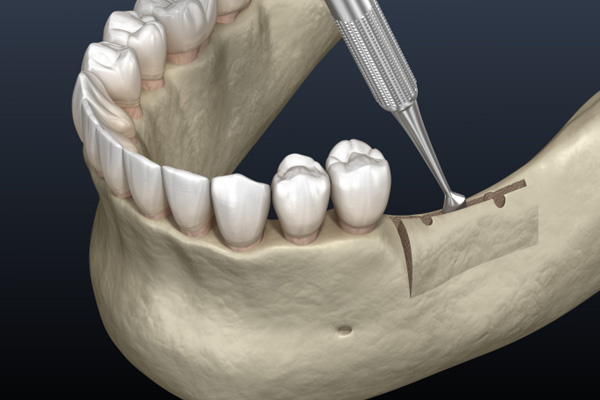
If your jawbone isn’t robust and wide enough to adequately support your dental implants in Burke, our team can help expand the area with a procedure known as ridge expansion. This involves dividing the jawbone and filling the area with a bone graft to widen it. After you’ve healed, our team can place your dental implants!
Dental Implant Technology

Placing dental implants means making sure that every post is inserted in precisely the correct spot in the jaw. To help ensure that everything goes as planned during the implant process, we make use of modern advancements such as 3D cone beam imaging and guided dental implant surgery in order to maximize the chances of successful treatment. Here’s how we use state-of-the-art technology to plan and carry out the dental implant procedure.
3D Cone Beam Imaging
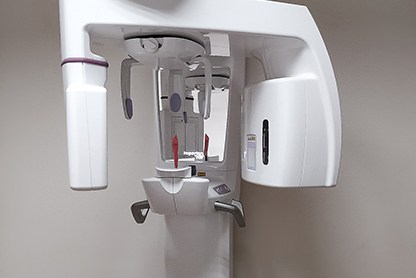
You might be expecting to have traditional dental X-rays taken before the dental implant process, but this approach typically won’t allow us to gather all of the information that we need. A 3D cone beam computed tomography (CBCT) scanner allows us to comprehensively map out your entire mouth and jaw, and the images it creates include critical details such as the locations of nerve paths and other relevant oral structures.
With our CBCT scanner, we can determine the best locations to insert the dental implant posts while also identifying any obstacles that will need to be accounted for during the surgery. The information provided by the scanner is invaluable when it comes to ensuring that your dental implants will be able to last for many years.
Guided Dental Implant Surgery

It’s not hard to figure out where a dental implant needs to go when there are still teeth on either side of the gap being filled. But if you have suffered from extensive tooth loss, locating the correct spots for the implant posts can be significantly trickier. Luckily, our team has a simple solution: create a surgical guide that gives us a clear visual of where the posts need to go.
To design the surgical guide, we will first need to perform a CBCT scan of your mouth. After that, the guide can be 3D-printed so that it can be used during the surgery.
Dental implant procedures performed with a surgical guide tend to be much more precise. This helps reduce discomfort during the process, which is good news for our patients. On top of that, the surgical guide will allow us to make smaller incisions in your gums; this means you won’t have to wait as long for the tissue to recover following the surgery.
Digital Impression System
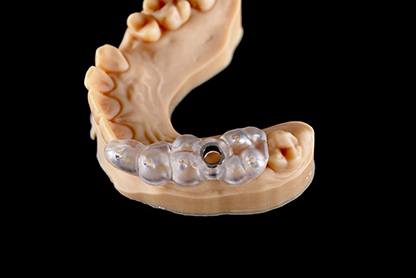
Every smile is unique, which is why the crown, bridge, or denture that your dental implants will support must be carefully customized to ensure that it’s the right shape and size. Instead of relying on traditional impressions made out of dental putty, we make use of digital impressions, which simply involve creating a three-dimensional model of your mouth based on a quick scan.
Digital impressions have many advantages over traditional ones. They can be taken faster, and there’s no uncomfortable putty involved. On top of that, the precision of digital impressions means that errors are less likely to occur.
Dental Implant FAQs
Are you trying to decide whether dental implants are right for you? Or have you already made up your mind to pursue the treatment in order to rebuild your smile? In either case, it’s important to make sure that you’re fully informed about the dental implant process. Check the FAQs below to discover the answers to a number of popular dental implant inquiries, and don’t hesitate to contact our team if there’s something else that you want to ask.
Am I Too Young to Get Dental Implants?
Dental implants are typically not recommended for anyone under the age of 18. This is due to the fact that inserting implant posts into a jaw that is still developing could lead to serious problems. It normally takes until young adulthood for the jaw to become fully grown, and in some cases, the process won’t be complete until the individual’s mid-20s. On top of that, the development of the jawbone tends to be slower in men compared to women.
It's worth noting that while there is a minimum age limit for dental implants, there is no maximum age limit. After reaching adulthood, the overall health of your mouth and body matters more than your age when it comes to dental implant eligibility.
Will People Be Able to Tell That I Have Dental Implants?
By the end of the process, your dental implants will be virtually indistinguishable from your natural teeth. Not only will the implant posts be completely hidden, but the prosthesis that they support will be personalized for your unique smile, resulting in a very lifelike appearance. On top of that, your dental implants will keep your replacement teeth anchored in place at all times; there’s no danger of them slipping at awkward moments the way that dentures sometimes do when they haven’t been fitted properly.
Do Dental Implants Decay?
Dental implants mimic natural teeth in many important ways, but thankfully one trait they don’t mimic is susceptibility to decay. You will never have to worry about cavities forming in your dental implants since they aren’t made out of enamel. That said, oral hygiene should still be one of your top priorities. You need to take good care of your gums in order to avoid infections that could cause problems for your dental implants. (And of course, your remaining teeth will still be potential targets for decay-causing bacteria.)
How Soon After a Tooth Extraction Can I Get Dental Implants?
The answer depends on the state of your jawbone. Sometimes it may be possible to have a dental implant placed right away, but in other cases, it’s necessary to wait in order to give the mouth a chance to heal. If there’s a delay, you can generally expect to wait between three to six months. It’s important not to wait too long, though, as the lack of stimulation will eventually lead to bone loss in the jaw, which can affect the viability of dental implants.
